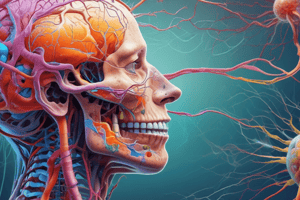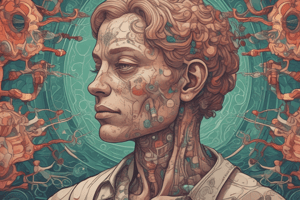Podcast
Questions and Answers
Which of the following neurodegenerative disorders is characterized by damage to dopamine-producing neurons?
Which of the following neurodegenerative disorders is characterized by damage to dopamine-producing neurons?
- Autism spectrum disorder
- Alzheimer's disease
- Huntington's disease
- Parkinson's disease (correct)
What is the primary function of the pituitary gland?
What is the primary function of the pituitary gland?
- Producing sex hormones
- Regulating other endocrine glands (correct)
- Regulating metabolism
- Producing insulin
Which of the following hormones is involved in regulating blood sugar levels?
Which of the following hormones is involved in regulating blood sugar levels?
- Insulin and glucagon (correct)
- Thyroxine (T4) and triiodothyronine (T3)
- Epinephrine and norepinephrine
- Adrenaline and cortisol
What type of feedback mechanism is involved in the regulation of hormone production?
What type of feedback mechanism is involved in the regulation of hormone production?
Which of the following disorders is characterized by recurrent seizures due to abnormal electrical activity in the brain?
Which of the following disorders is characterized by recurrent seizures due to abnormal electrical activity in the brain?
What is the primary function of the thyroid gland?
What is the primary function of the thyroid gland?
Which of the following glands produces sex hormones that regulate reproductive development and function?
Which of the following glands produces sex hormones that regulate reproductive development and function?
What is the effect of insulin on glucose levels?
What is the effect of insulin on glucose levels?
What is the primary function of the adrenal glands?
What is the primary function of the adrenal glands?
Which part of a neuron receives signals from other neurons?
Which part of a neuron receives signals from other neurons?
What is the common function of endocrine glands?
What is the common function of endocrine glands?
Which endocrine gland regulates body temperature, hunger, and thirst?
Which endocrine gland regulates body temperature, hunger, and thirst?
What is the function of the axon in a neuron?
What is the function of the axon in a neuron?
What is the primary function of terminal buttons in a neuron?
What is the primary function of terminal buttons in a neuron?
Which of the following hormone regulation pathways is involved in regulating stress response?
Which of the following hormone regulation pathways is involved in regulating stress response?
What is the characteristic of Alzheimer's disease?
What is the characteristic of Alzheimer's disease?
What is the gap between the terminal button of one neuron and the dendrite of another called?
What is the gap between the terminal button of one neuron and the dendrite of another called?
Which of the following is an example of a negative feedback mechanism?
Which of the following is an example of a negative feedback mechanism?
What is the characteristic of depression?
What is the characteristic of depression?
Flashcards
Alzheimer's Disease
Alzheimer's Disease
Progressive loss of neurons, resulting in memory loss and cognitive decline.
Parkinson's Disease
Parkinson's Disease
Damage to dopamine-producing neurons, leading to motor symptoms, including tremors.
Huntington's Disease
Huntington's Disease
Progressive damage to neurons causing motor and cognitive symptoms.
Autism Spectrum Disorder
Autism Spectrum Disorder
Signup and view all the flashcards
Attention Deficit Hyperactivity Disorder (ADHD)
Attention Deficit Hyperactivity Disorder (ADHD)
Signup and view all the flashcards
Stroke
Stroke
Signup and view all the flashcards
Epilepsy
Epilepsy
Signup and view all the flashcards
What is the main function of the pituitary gland?
What is the main function of the pituitary gland?
Signup and view all the flashcards
What hormones does the pituitary gland produce?
What hormones does the pituitary gland produce?
Signup and view all the flashcards
What does the Thyroid Gland do?
What does the Thyroid Gland do?
Signup and view all the flashcards
What are the Adrenal Gland's functions?
What are the Adrenal Gland's functions?
Signup and view all the flashcards
What does the Pancreas do?
What does the Pancreas do?
Signup and view all the flashcards
What are the functions of the Ovaries and Testes?
What are the functions of the Ovaries and Testes?
Signup and view all the flashcards
Negative Feedback Mechanism
Negative Feedback Mechanism
Signup and view all the flashcards
Positive Feedback Mechanism
Positive Feedback Mechanism
Signup and view all the flashcards
Synergistic Effects
Synergistic Effects
Signup and view all the flashcards
Antagonistic Effects
Antagonistic Effects
Signup and view all the flashcards
What does Insulin do?
What does Insulin do?
Signup and view all the flashcards
What is the function of Glucagon?
What is the function of Glucagon?
Signup and view all the flashcards
Study Notes
Nervous System Disorders
- Neurodegenerative disorders:
- Alzheimer's disease: progressive loss of neurons, memory loss, and cognitive decline
- Parkinson's disease: damage to dopamine-producing neurons, motor symptoms, and tremors
- Huntington's disease: progressive damage to neurons, motor and cognitive symptoms
- Neurodevelopmental disorders:
- Autism spectrum disorder: impaired social interaction, communication, and repetitive behaviors
- Attention deficit hyperactivity disorder (ADHD): impaired attention, impulse control, and hyperactivity
- Neurological disorders:
- Stroke: blockage of blood flow to the brain, leading to cell death and cognitive/physical impairment
- Epilepsy: recurrent seizures due to abnormal electrical activity in the brain
Endocrine Glands
- Pituitary gland:
- Regulates other endocrine glands
- Produces hormones that stimulate growth and development
- Thyroid gland:
- Produces thyroxine (T4) and triiodothyronine (T3) hormones, regulating metabolism
- Adrenal glands:
- Produce epinephrine (adrenaline) and norepinephrine, regulating stress response and blood pressure
- Pancreas:
- Produces insulin and glucagon, regulating blood sugar levels
- Ovaries (in females) and testes (in males):
- Produce sex hormones, regulating reproductive development and function
Hormone Regulation
- Feedback mechanisms:
- Negative feedback: hormone production decreases in response to high levels of the hormone
- Positive feedback: hormone production increases in response to low levels of the hormone
- Hormone interactions:
- Synergistic effects: multiple hormones work together to produce a response
- Antagonistic effects: one hormone opposes the action of another hormone
- Hormone regulation of metabolism:
- Insulin: regulates glucose uptake and storage
- Glucagon: regulates glucose release from storage
- Thyroid hormones: regulate metabolic rate
Nervous System Disorders
- Alzheimer's disease: characterized by progressive loss of neurons, resulting in memory loss and cognitive decline
- Parkinson's disease: damage to dopamine-producing neurons leads to motor symptoms, including tremors
- Huntington's disease: progressive damage to neurons causes motor and cognitive symptoms
- Autism spectrum disorder: impairments in social interaction, communication, and repetitive behaviors
- Attention deficit hyperactivity disorder (ADHD): impairments in attention, impulse control, and hyperactivity
- Stroke: blockage of blood flow to the brain leads to cell death and cognitive/physical impairment
- Epilepsy: recurrent seizures due to abnormal electrical activity in the brain
Endocrine Glands
Pituitary Gland
- Regulates other endocrine glands
- Produces hormones that stimulate growth and development
Thyroid Gland
- Produces thyroxine (T4) and triiodothyronine (T3) hormones, regulating metabolism
Adrenal Glands
- Produces epinephrine (adrenaline) and norepinephrine, regulating stress response and blood pressure
Pancreas
- Produces insulin and glucagon, regulating blood sugar levels
Ovaries (in females) and Testes (in males)
- Produce sex hormones, regulating reproductive development and function
Hormone Regulation
Feedback Mechanisms
- Negative feedback: hormone production decreases in response to high levels of the hormone
- Positive feedback: hormone production increases in response to low levels of the hormone
Hormone Interactions
- Synergistic effects: multiple hormones work together to produce a response
- Antagonistic effects: one hormone opposes the action of another hormone
Hormone Regulation of Metabolism
- Insulin: regulates glucose uptake and storage
- Glucagon: regulates glucose release from storage
- Thyroid hormones: regulate metabolic rate
Endocrine Glands
- TYPES OF ENDOCRINE GLANDS:
- Pituitary gland regulates other endocrine glands
- Thyroid gland regulates metabolism
- Adrenal glands regulate stress response
- Pancreas regulates blood sugar levels
- Ovaries regulate reproductive cycle in females
- Testes regulate reproductive cycle in males
- Hypothalamus regulates body temperature, hunger, and thirst
- FUNCTIONS OF ENDOCRINE GLANDS:
- Produce and secrete hormones into the bloodstream
- Regulate various bodily functions, such as growth and development, metabolism, and reproductive cycle
Neuron Structure
- COMPONENTS OF A NEURON:
- Dendrites receive signals from other neurons
- Cell Body contains the nucleus and maintains the cell's functions
- Axon transmits signals to other neurons or to muscles or glands
- Terminal Buttons release neurotransmitters into the synapse
- SYNAPSE:
- Gap between the terminal button of one neuron and the dendrite of another
- Neurotransmitters are released into the synapse to transmit signals
Hormone Regulation
- NEGATIVE FEEDBACK MECHANISM:
- Feedback loop that prevents overproduction of a hormone
- Example: thyroid-stimulating hormone (TSH) production is inhibited when thyroid hormone levels are high
- HORMONE REGULATION PATHWAYS:
- Hypothalamic-pituitary-adrenal (HPA) axis regulates stress response
- Hypothalamic-pituitary-thyroid (HPT) axis regulates metabolism
- Hypothalamic-pituitary-gonadal (HPG) axis regulates reproductive cycle
Nervous System Disorders
- NEUROLOGICAL DISORDERS:
- Alzheimer's disease: progressive decline in cognitive function
- Parkinson's disease: motor dysfunction and tremors
- Huntington's disease: progressive decline in cognitive and motor function
- PSYCHOLOGICAL DISORDERS:
- Depression: mood disorder characterized by low mood and anhedonia
- Anxiety disorders: excessive fear or anxiety
- Schizophrenia: thought disorder characterized by delusions and hallucinations
- NEURODEVELOPMENTAL DISORDERS:
- Autism spectrum disorder: impaired social interaction and communication
- Attention deficit hyperactivity disorder (ADHD): impaired attention and impulse control
Studying That Suits You
Use AI to generate personalized quizzes and flashcards to suit your learning preferences.




